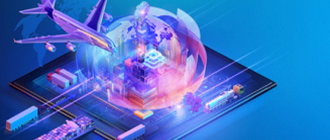
The 5G Logistics Revolution
By Robert Stockdill | July 29, 2019
The possibilities of 5G are game-changing. Companies should start integrating advanced technology to future-proof their business and remain competitive.
Mobile communication is about to experience its greatest revolution in the 12 years since Apple invented the smartphone. This time, it is not handsets that will drive the change, rather the network technology we have come to know as 5G.
5G technology offers data speeds 20-times faster than existing 4G long-term evolution (LTE) networks, promotes mass adoption of Internet of Things (IoT) by enhancing information exchange across different appliances, and better supports artificial intelligence (AI), virtual reality (VR) and augmented reality (AR) thanks to the low latency. In some cases, 5G will offer speeds 100-times faster.
South Korea became the first country in the world to launch fully-fledged 5G commercial services in April. By June of this year, 5G subscribers in the country had surpassed the 1 million mark, encouraged by aggressive network promotional campaigns, along with Samsung’s new 5G-enabled Galaxy S10 smartphone. Next year, networks will be established in Australia, Japan, Hong Kong and Singapore, initially in dense city environs before moving into smaller population centers. Worldwide rollout is inevitable. An Apple executive has confirmed that some of its next-generation iPhones scheduled for release next year will be 5G enabled.
“The next chapter of IoT is just beginning,” wrote Carrie MacGillivray, vice-president for IoT and mobility at research house IDC, in a recent report. “We see a shift from digitally enabling the physical to automating and augmenting the human experience with a connected world.” Not surprisingly, that massive increase in speed and response time is delighting gamers, news services and entertainment broadcasters: graphics or video imagery will be able to be streamed seamlessly in high definition.
But are retailers ready? How many even understand the potential of the new-generation technology which is set to change our daily lives, let alone are making plans to ride the wave. To imagine the impact 5G will have on retail business, think of every single function of a retail store that becomes digital: the in-store AR experience, the product(s) presented to customers through omni-channels, the seamless payment gateways, and the logistics required to fulfill customers’ order. Now think of them functioning at 20 times the current speed. That’s 20 times the data transfer rate. Now think of it happening at 100 times the current speed. That is 5G.
Massive benefits for retailers
E-tailers will discover massive benefits using 5G. To customers, at the start of the process when consumers are researching and purchasing products to during the delivery process, the incorporation of 5G and other technologies will without doubt uplift their experience. Despite the frustration faced by the early adopters of VR and AR technologies, both consumers and marketers, because of the latency, dropouts and limitations on the imagery definition; the arrival of 5G will eventually enable a seamless, free-moving experience outside a fixed usually indoor, environment.
The high network speeds will allow a vastly more complex level of engagement between retailers and shoppers. It will allow high-quality imagery, seamless streaming 3D video and personalized product matching, including previews of how a product will look alongside a previous purchase; or for homewares or furniture, for example, inside a living space or office.
5G also brings transparency. Put simply, faster data means it will soon be easier for your customers to compare your offer with those of your competitors. There won’t be secrets anymore on pricing, product specification, determining suitability for purpose, and more importantly, a store’s credibility – making the reviews from customers after checking out the shopping basket all the more important.
Price, once a bedrock of customer decision, is being overtaken by value as a leading consideration. Consumers who connect through 5G devices will be able to access as much information as they want online faster than ever before: that includes price comparison sites, product review blog posts, unboxing videos by KOLs. Such content has been available in the past, and more are coming along with the rise of micro-influencers, which has accelerated since 2017. “The advent of 5G is going to be a make-or-break moment for retailers,” says Corey Pierson, co-founder and CEO of US advanced customer analytics consultancy Custora. “And those that can effectively leverage the data at their disposal only stand to gain.”
Research by Mintel found consumers lack trust in the online shopping process, a major barrier to online shopping; not just trust in data protection issues, but also the high chance of buying counterfeit products – more than 70% of them are sold online, and whether an unbranded product is true to the online description is sometimes also questionable.
Improved consumer confidence and trust will remove a pain point for shoppers, potentially reducing return rates as well. But to make the most of this opportunity, retailers will have to embrace technologies like AR, VR, chatbots and video streaming to replicate the in-store shopping experience for customers in a digital environment.
A synonym of agility
5G will be a synonym of agility, allowing changes of actions and vast amounts of information to be transmittable in an instant. An order could be cancelled while the product is enroute to the recipient: warehousing management tools could simultaneously update the inventory records and if there is another order waiting, redirect the product to another customer, sending all relevant details to the delivery driver in a heartbeat.
With connectivity everywhere, technology like autonomous vehicles that are currently in limited testing in several countries such as Singapore and the US, will soon be commonplace in the major cities worldwide.
On the other hand, imagine customers being able to see their shipments in real-time via AR through their smart phones, a service more than just the tracking of location thanks to the improved IOT; and logistics companies being able to increase the automation of sorting and delivery of packages, resulting in higher accuracy and speed to reaching the customers. 5G is a key to realizing the future of e-commerce fulfillment.
5G is an enabler
So to conclude: 5G will enable unprecedented levels of data and content exchanges through connectivity 20 to 100 times faster than any previous mobile network technology.
As the networks are rolled out in more and more cities, it is imperative that companies embrace technologies based on 5G connectivity to remain competitive and responsive to consumer needs. As more and more consumers purchase and experience 5G devices, their expectations will rise: they will demand the brands and suppliers they deal with are keeping up with them, whether selling products, providing services such as delivery or providing content.
5G is as much a cornerstone of customer engagement and connectivity in the next decade as smartphones and social media were in the last. It is critical to remember that 5G is an enabler, not a solution in itself.
SHARE THIS STORY
- Generative AI: A New Frontier
- How To Ship A Giant Panda
- How To Make Freight Shipments Work For Your Small Business
- The Rise Of Intra-Asia Trade: Opportunities In The China-Southeast Asia Corridor
- Where Do Old Planes Go When They Retire?
- What’s So Dangerous About Coconuts? Your Guide To Dangerous Goods Logistics
Sign up now and save on your shipping rates!
Sign up now and earn discounts by shipping instantly with FedEx Ship ManagerTM at fedex.com.
Recommended For You

The Big Tech That’s Shaping Tomorrow – Today
From AI bots to autonomous vehicles, our tech-driven future will be filled with innovations that can transform how small businesses operate and grow.
Read More
How Can Technology Deliver Superior Customer Service?
Logistics technology can help small businesses connect with their customers in new ways. Kawal Preet shares how healthcare businesses can grow.
Read More
Blockchain Technology Is Delivering The Future – Now
Blockchain isn’t just the tech of the future. It’s bringing significant change to our lives and how we do business.
Read More